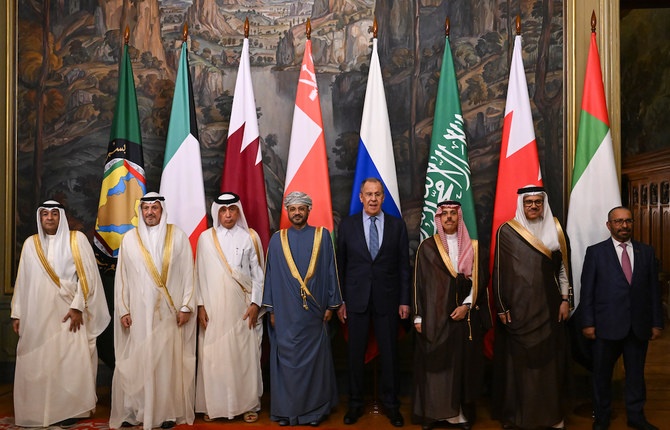Alwaght- Amid strained international atmosphere because of Ukraine crisis, on Tuesday, the sixth summit of Russian-(Persian) Gulf Cooperation Council strategic dialogue was held in Moscow with the presence of foreign ministers. At its end, the two sides released a statement highlighting their resolve to boost relations at all levels. And according to Russian Foreign Minister Sergey Lavrov, the two sides designed a 5-year comprehensive cooperation program.
The first meeting was held in Abu Dhabi in 2011, during which the two sides agreed on a roadmap that set strategic dialogue mechanisms and foundations of sustainable cooperation between the Persian Gulf states and Russia in political and military coordination, economic cooperation and investment, trade, energy, education, scientific research, environment, and health.
Since then, five summits have been held. The second one was hosted by Saudi Arabia in November 2012, the third one in February 2014 in Kuwait, and fourth one in May 2016 in Russia. A several-year hiatus hit the summit due to the 2017 (P) GCC crisis. The meetings were resumed in 2022 with the fifth one. And the seventh one is set to be hosted by Doha, according to Lavrov.
Although strategic talks between the two sides have been going on for nearly 13 years, the war in Ukraine and the rise in oil prices have given their relations a boom in recent months.
In the joint press conference after the meeting, Lavrov said that trade between Russia and the Arab bloc has reached $11 billion. This is while according to the report of the bloc’s website, their bilateral trade in 2021 was $7.6 billion, showing a significant growth.
“In general, we can say that strategic dialogue is a good way to create more motivation for trade relations and political cooperation for stability and good neighborliness in the region,” said Lavrov.
Russia-(P) GCC cooperation course
In the 1990s, despite official diplomatic relations between Russia and the Persian Gulf states, the atmosphere of relations was far from positive due to internal developments in Russia and international developments like first Persian World war and Balkans crisis.
After the shock of collapse of the Soviet Union in the early 1990s, Russia, led by Vladimir Putin who assumed the power in the 2000, started internal and foreign policy reforms and rebuilding its international position. Oil price rise in the first decade of the new century was a key factor helping Moscow improve its economic conditions and settle many of its home challenges. It also boosted Kremlin leaders’ self-confidence to restore the country's past role in the international developments. Meanwhile, restoration of past influence in the Arab world was put on agenda.
Visit to Moscow of Saudi King Abdullah bin Abdulaziz in 2003 and visit to Riyadh of Putin in 2007 and then to Qatar and the UAE were important developments in the history of relations of new Russia with the Persian Gulf states.
In the years after, despite conflict of views on various cases like Iran nuclear program and Syrian crisis, their diplomatic visits and interactions continued. After the three-day visit of King Salman bin Abdulaziz to Moscow in 2017, which was described by media as a “surprise closeness of two adversaries”, Putin also visited Saudi Arabia and the UAE in 2019.
Arab tendency to Moscow against the backdrop of cutting reliance on Washington
At a time the Russian-Western tensions have surged to their highest level since the Cold War, the tendency of (P) GCC states to Russia while they have been the US allies for several decades indicates their distancing from Washington. The decline of US’s international hegemony and the drop of this country's influence in the developments of West Asia region, which is increasingly challenged by emerging powers such as China, Russia and Iran, and the shift of the center of international trade from the West to the East have the greatest effect on shift of the Arab view to the emerging multipolar world order.
Over the past months, despite Washington's pressure to increase oil production in order to reduce the price of energy, which increased to more than $100 per barrel due to the effects of the war in Ukraine, Saudi Arabia and the UAE together with Russia under OPEC Plus choose to cut the oil output and thus maintain the current prices in brazen defiance to Washington.
Also, although at the beginning of the crisis, the Persian Gulf countries signed a statement emphasizing on the independence and sovereignty of Ukraine, the fifth strategic dialogue was held in June 2022 only about 4 months after the start of Russia's special military operation in Riyadh, where Russian FM expressed his satisfaction with the stances of the Persian Gulf countries on the war.
Iran's détente agreement with Saudi Arabia in March and shortly later return of Russia's ally Syria to the Arab League were other steps that helped bring the Arab bloc closer to Russia and distance it from the West and the US.
And now that the US is striving to bring Russia to its knees with economic pressures and is setting its eyes on the international allies for this aim, Moscow sounds upbeat about broader oil and trade partnership with the Arab world. Lavrov talked about “initiatives for independent payment mechanisms and settlement hubs in a healthy process.” The Arab diplomats, on the other side, criticized use of hard currencies as pressure instruments in direct attack on Washington’s sanction policies.



























